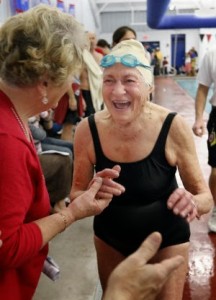Even at 100, still making a splash
After swimming the 50-meter freestyle Sunday morning, Marie Kelleher climbed out of the pool, posed for a few pictures — she was like a celebrity, so many people wanted to put their arms around her and smile for a camera — and eventually pulled on some dry clothes.
Once she had run the gauntlet of well-wishers, I asked if she felt good during the race.
“No,” she said with a laugh, “but I finished.”
Finish, she did — and set a national record, which is pretty much what she does every time she swims a race since she recently ascended into an age group where there isn’t a lot of competition. She turned 100 in December.
Still, Sunday’s swim at the steamy NOVA of Virginia Aquatic Center in the David Gregg III Memorial Meet, the Virginia Masters Swim Team’s annual winter meet for swimmers ages 18 to 100-plus, was something of a milestone. It was Kelleher’s first race since she turned 100, and also her first since she experienced what she discreetly referred to as “this problem.”
By this problem, she meant a stroke, and I don’t mean the butterfly.
After swimming one morning in early November, she was having breakfast when she discovered she couldn’t pick up a spoon. She phoned one of her sons, and her speech was slurred, so he hustled to her Glen Allen home and took her to the hospital.
She was fortunate, she said, the stroke was a mild one.
After weeks of relentless rehabilitation, Kelleher regained her strength and coordination. Now, she’s driving again — yes, she drives herself to work; she remains chairman of Kelleher Corp., the family business — and she’s back in the pool, swimming laps several days a week before dawn.
I want to be like her if I get to be 100.
Nancy Miller, the director of Sunday’s meet, has known Kelleher for years and used to be her coach. She confirmed to me that Kelleher is at once modest and reserved, yet also determined and fiercely competitive.
“Marie is indeed a force of nature,” Miller said, before adding: “She is, quite simply, my hero.”
Kelleher spent her early childhood in Brooklyn, N.Y., in a household where German and English were spoken until her father, who was born in Switzerland, came home from his job with a plastering company one day and said they had better stop speaking German, or else he might be accused of being a spy. World War I was in progress.
Soon after, the family moved to Alexandria, where Kelleher did most of her growing up and where she learned to swim at a municipal pool, the afternoon reward for a morning of chores. However, she didn’t swim competitively until she “retired” at age 65, and her daughter, who did a lot of swimming, thought it would be good for her mother to do the same, so she signed her up for a meet.
“I got hooked,” said Kelleher.
Swimming wasn’t her only post-retirement pursuit. She began taking classes at Virginia Commonwealth University — not to earn a degree, but to “keep my mind in shape” — and learned to do needlepoint and even took piano lessons.
“I didn’t want to just vegetate,” she said. “That, I think, is the worst thing you can do.”
She doesn’t watch television, preferring to read instead. She has never smoked, and alcohol holds no appeal; a long-ago sip of wine didn’t do anything for her. Nor does she drink coffee, tea or sodas. She is, however, a fan of chocolate.
When I visited Kelleher at her home last week, she warned me that she is a slow swimmer — “I guess age does that to you,” she said with a laugh — and how she hates that she might delay others.
No one seemed to be bothered at Sunday’s meet, in which most swimmers were a fraction of her age. The next-oldest swimmer was 90, and several swimmers are in their 80s.
It’s true the other swimmers in her race were finished with their 50 meters by the time she made the turn at 25. What she lacks in speed, though, she makes up in efficiency: She truly glides across the water in the sort of effortless manner of someone who knows what she’s doing. Her approach is simple: a nice, steady pace with no thrashing about, just as she has led her life.
The crowd began to cheer as she made the turn and roared when she finished, standing and applauding, appreciating not so much outright speed as a victory of personal and historic achievement. Miller said she knows of only two registered master swimmers over the age of 100, both in Europe. This is not something you see every day.
When it was over, Kelleher was greeted by a small mob of children, grandchildren and great-grandchildren. “It’s a family reunion,” her son Joe said of each of his mom’s swim meets.
Her time Sunday was 1:58.08. She didn’t feel it was her best, but every athlete has off days. Yet, when you’re 100 and you’re three months out from lying in a hospital being treated for a stroke, I can’t help but think every day you can swim is a good one.



